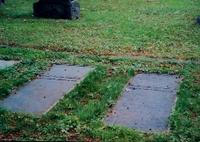 Next stop on the tour was Governor Philip Fox LaFollette (1897-1965), son of Robert 'Fighting Bob' LaFollette. He was elected to three terms, serving as first a republican and later a progressive, and was responsible for reestablishing the movement in the 1930s that was started by his father. Many of the programs he established to lift Wisconsin out of the Great Depression were later used by President Roosevelt as part of the ‘New Deal.’ Although he opposed US entry into WWII, Philip Fox LaFollette served on the staff of General MacArthur and was present when the Japanese surrendered onboard the USS Missouri. You'll note how unpretentious the family markers are, compared to other prominent men of their time. (Portrayed by John Eichenlaub.)
Next stop on the tour was Governor Philip Fox LaFollette (1897-1965), son of Robert 'Fighting Bob' LaFollette. He was elected to three terms, serving as first a republican and later a progressive, and was responsible for reestablishing the movement in the 1930s that was started by his father. Many of the programs he established to lift Wisconsin out of the Great Depression were later used by President Roosevelt as part of the ‘New Deal.’ Although he opposed US entry into WWII, Philip Fox LaFollette served on the staff of General MacArthur and was present when the Japanese surrendered onboard the USS Missouri. You'll note how unpretentious the family markers are, compared to other prominent men of their time. (Portrayed by John Eichenlaub.)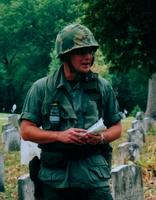 Major Charles J. Thoma (1936-1967) was the first Vietnam veteran ever to be featured on the “Talking Spirits” tour. Thoma graduated UW-Madison in 1958 before training at Fort Benning in Georgia. He served in Panama and Korea prior to serving in Vietnam as a battalion operations officer (S-3) for the infamous 2/28 'Black Lions' of the 1st Infantry Division.
Major Charles J. Thoma (1936-1967) was the first Vietnam veteran ever to be featured on the “Talking Spirits” tour. Thoma graduated UW-Madison in 1958 before training at Fort Benning in Georgia. He served in Panama and Korea prior to serving in Vietnam as a battalion operations officer (S-3) for the infamous 2/28 'Black Lions' of the 1st Infantry Division.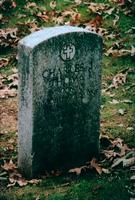 The Black Lions were a unit well-known for their valor and fierce fighting in previous conflicts, going back to WWI, and were feared by their enemies. The unit is featured in the David Maraniss book, They Marched Into Sunlight, basis for the new documentary, Two Days in October, which is to air October 17. The PBS documentary is part of its 'American Experience' series, and is an adaptation of the acclaimed 2003 Maraniss book. Madison has a prominent role in both the book and 90-minute film, which are about the war and anti-war protest. Charles Thoma was killed during a search-and-destroy mission in the jungle northwest of Saigon on January 12, 1967. Tom Lodewyck portrayed him on the tour.
The Black Lions were a unit well-known for their valor and fierce fighting in previous conflicts, going back to WWI, and were feared by their enemies. The unit is featured in the David Maraniss book, They Marched Into Sunlight, basis for the new documentary, Two Days in October, which is to air October 17. The PBS documentary is part of its 'American Experience' series, and is an adaptation of the acclaimed 2003 Maraniss book. Madison has a prominent role in both the book and 90-minute film, which are about the war and anti-war protest. Charles Thoma was killed during a search-and-destroy mission in the jungle northwest of Saigon on January 12, 1967. Tom Lodewyck portrayed him on the tour.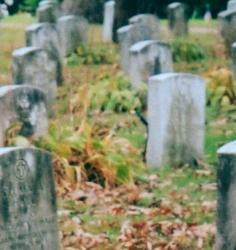
Portrayed by Craig Hudson, 'Sailor' Art Thomas (1924-2003) was the first great African-American wrestling star. Orphaned soon after the family moved to Wisconsin from Arkansas, Thomas served in the navy near the end of WWII before returning to Madison where he worked at the Greyhound Bus depot. Since his days in the navy he had dreamed of becoming a professional wrestler, deeming himself not quick enough to be a boxer. It was difficult for him to break into the sport—managers refused to train him, and other wrestlers didn’t want to fight a black man. That all changed the day a loaded bus about to depart the terminal suddenly had a flat tire. The jack was broken, and the only way to fix it seemed to be emptying the bus completely of passengers and luggage.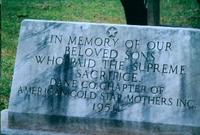 Without thinking, Thomas bent down and slowly lifted the back of the bus, holding it for several minutes while they changed the tire. When he set it back down again, Jimmy Demetral (local residents will recognize that name from Demetral Field) was standing beside him. “I hear you want to be a wrestler,” he said to Thomas, and thus began his illustrious career. He soon became a local, national and international hero due to his "physique and good-nature," and became World Heavyweight Champion in 1972. As his grave is more difficult to access, actor Craig Hudson delivered his part next to the memorial dedicated by the Dane County Chapter of American Gold Star Mothers Inc.
Without thinking, Thomas bent down and slowly lifted the back of the bus, holding it for several minutes while they changed the tire. When he set it back down again, Jimmy Demetral (local residents will recognize that name from Demetral Field) was standing beside him. “I hear you want to be a wrestler,” he said to Thomas, and thus began his illustrious career. He soon became a local, national and international hero due to his "physique and good-nature," and became World Heavyweight Champion in 1972. As his grave is more difficult to access, actor Craig Hudson delivered his part next to the memorial dedicated by the Dane County Chapter of American Gold Star Mothers Inc.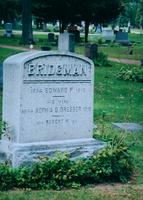 Our next stop was to be the gravesite of Edward P. Bridgman (1834-1915), but the actor who was to play him, Greg Johnson, called in sick that day (guess they didn’t think of understudies). Bridgman served with the 37th Massachusetts Volunteers during the Civil War and moved to Wisconsin in the 1870s, coming to Madison in 1901 where he was a popular Memorial Day speaker until he died.
Our next stop was to be the gravesite of Edward P. Bridgman (1834-1915), but the actor who was to play him, Greg Johnson, called in sick that day (guess they didn’t think of understudies). Bridgman served with the 37th Massachusetts Volunteers during the Civil War and moved to Wisconsin in the 1870s, coming to Madison in 1901 where he was a popular Memorial Day speaker until he died.





No comments:
Post a Comment